 Petzlover
Petzlover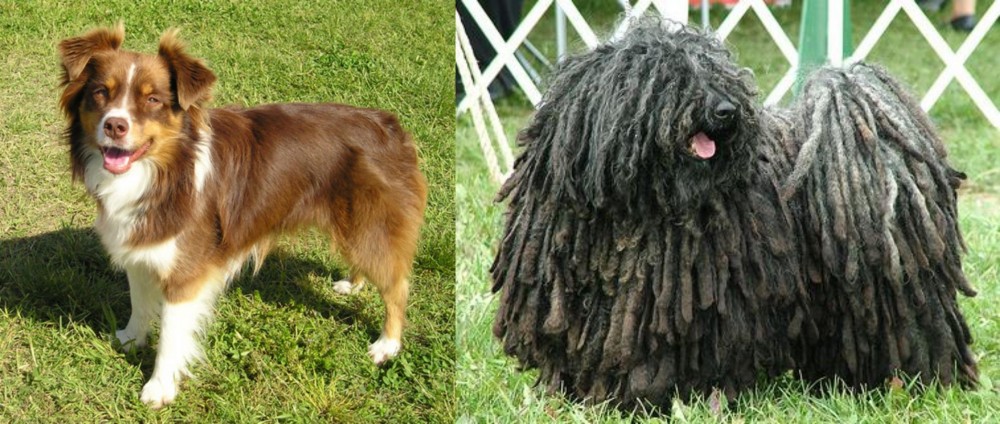 Miniature Australian Shepherd is originated from United States but Puli is originated from Hungary. Both Miniature Australian Shepherd and Puli are having almost same height. Both Miniature Australian Shepherd and Puli are having almost same weight. Both Miniature Australian Shepherd and Puli has almost same life span. Miniature Australian Shepherd may have more litter size than Puli. Miniature Australian Shepherd requires Moderate Maintenance. But Puli requires High Maintenance
Miniature Australian Shepherd is originated from United States but Puli is originated from Hungary. Both Miniature Australian Shepherd and Puli are having almost same height. Both Miniature Australian Shepherd and Puli are having almost same weight. Both Miniature Australian Shepherd and Puli has almost same life span. Miniature Australian Shepherd may have more litter size than Puli. Miniature Australian Shepherd requires Moderate Maintenance. But Puli requires High Maintenance
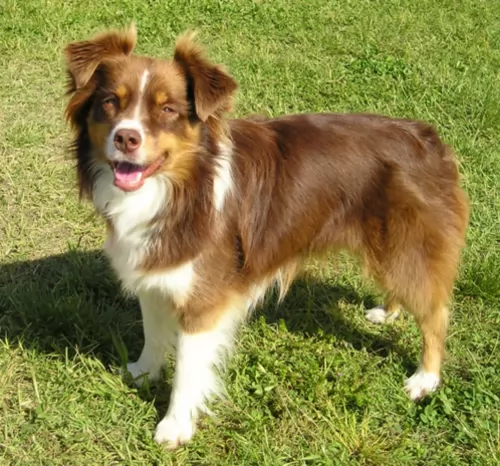 Unlike some miniaturized pure dog breeds, the Miniature Australian Shepherd is a breed of its own. The American Kennel Club and the United Kennel Club recognize that the miniature Australian Shepherd is the same as the miniature American Shepherd.
Unlike some miniaturized pure dog breeds, the Miniature Australian Shepherd is a breed of its own. The American Kennel Club and the United Kennel Club recognize that the miniature Australian Shepherd is the same as the miniature American Shepherd.
Certain breeding programs to develop the Miniature Australian Shepherd have been established and this dog is a small version of the Australian Shepherd. You can say that the Mini Australian Shepherd was developed in the 1960s and hails from the USA. American ranchers bred small Australian Shepherd dogs to create smaller replicas of the breed.
 The Puli’s history is ancient, going back about 2,000 years. It is believed that Sumerians used Puli-type dogs to herd sheep thousands of years ago.
The Puli’s history is ancient, going back about 2,000 years. It is believed that Sumerians used Puli-type dogs to herd sheep thousands of years ago.
Ancient excavations show signs of Puli dogs. It is believed that Magyar tribesmen brought Pulis to Hungary for their herding abilities. The Puli was registered by the American Kennel Club in 1936, and the Puli Club of America was formed in 1951.
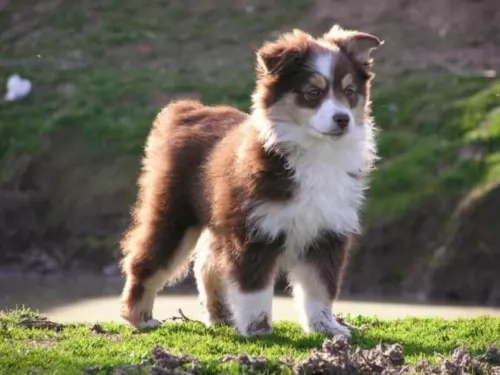 The Miniature Australian Shepherd’s coat is medium-length and is straight or wavy. It comes in a range of colors such as blue or red merle and red or black tricolor. There are white or tan markings as well. He is a small dog, standing at 33 - 46 cm in height and weighing 6 – 16kg.
The Miniature Australian Shepherd’s coat is medium-length and is straight or wavy. It comes in a range of colors such as blue or red merle and red or black tricolor. There are white or tan markings as well. He is a small dog, standing at 33 - 46 cm in height and weighing 6 – 16kg.
They have blue or brown eyes but some will even have one eye blue and the other brown. The ears are semi erect, semi floppy and the tail, while essentially left long and feathery, is sometimes docked.
Miniature Australian Shepherds are easygoing dogs who love being with their human families. They get on well with children in the home and are always willing to jump right in for a game.
They’re lively and agile and if its not games they’re busy with, they want to be on a walk. They’re loving and loyal and also eager to please, sensing what their owner wants.
They’re intelligent dogs too and easy to train so it is sure to go well with training and socialization, which is important for any dog. This training and socialization can actually help with problems a dog has such as being very nervous or being too active indoors. They become obedient and manageable wherever they are.
He is also willing to get on with other pets in the house. Just like the larger dog, the mini Australian Shepherd loves to be active and at work.
 The Puli is a medium sized dog from Hungary standing at between 36 an 45cm in height and weighing 10 to 13kg. He has always been a herding dog and his long,corded coat has been his trademark.
The Puli is a medium sized dog from Hungary standing at between 36 an 45cm in height and weighing 10 to 13kg. He has always been a herding dog and his long,corded coat has been his trademark.
The color of the coat can be black, white or cream but black is the color most seen with the Puli. The dog may well be a low shedder, but the coat is still going to need a lot of maintenance to keep it looking reasonable. It gets longer and longer and will need to be groomed to keep the cords neat and clean.
The Puli is an intelligent dog and it can be trained to respond to some simple commands. If the dog gets enough exercise, he can adapt to life in the country or in the city. As a herding dog he is used to being busy and will need walks, a run off his leash in the park and ball games.
They get on well with children and with other pets and are loyal to their owners and wary of strangers. They are highly active dogs these, and they just love playing games throughout their adult lives.
Because they are dogs which need a lot of exercise and space, they are more suited to life in the countryside as opposed to life on a small property in the city. They also make good faithful family guardians.
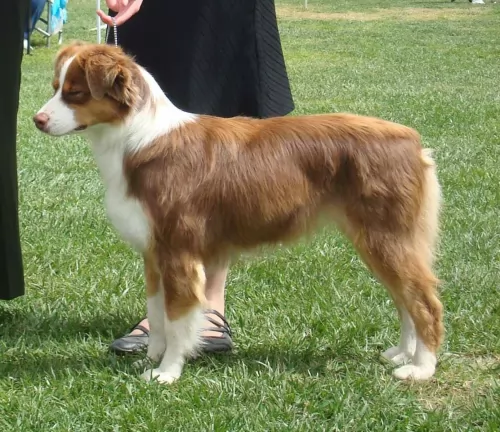 The wonderful friendly nature’s of these dogs make them excellent family pets, especially when they have been trained and socialized. They can live in the city or country but they will certainly require being exercised as they are an active breed, wanting to be busy with his human family.
The wonderful friendly nature’s of these dogs make them excellent family pets, especially when they have been trained and socialized. They can live in the city or country but they will certainly require being exercised as they are an active breed, wanting to be busy with his human family.
You can’t describe these dogs as low maintenance as they have long, thick hair that sheds and which will also need to be brushed regularly.
If you’re able to provide a good home for this beautiful, lively dog, then he will make you a splendid pet.
 Your Puli is a self-confident, strong willed dog that is intelligent and can learn to be obedient and well mannered. They are also social and playful, and will love to be a family pet, being prepared to provide friendship and loyalty.
Your Puli is a self-confident, strong willed dog that is intelligent and can learn to be obedient and well mannered. They are also social and playful, and will love to be a family pet, being prepared to provide friendship and loyalty.
Because he has always been a herding dog, he takes his role of guardian and protector of his human family seriously. He makes a splendid pet if you’re ready to tackle the long coat which makes sure he doesn’t fit into the low-maintenance category.
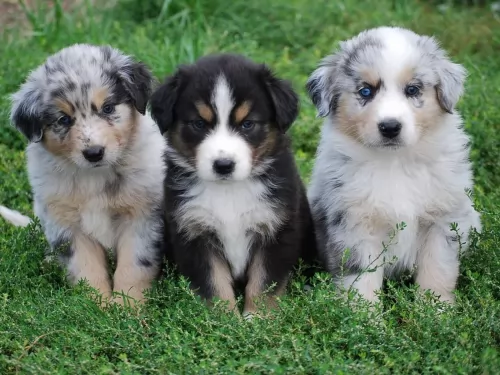 Your Miniature Australian Shepherd can enjoy good health if you make sure he has a nutritious diet, he is well exercised and he is happy and content because of the attention you give him. He can easily reach 13 years of age.
Your Miniature Australian Shepherd can enjoy good health if you make sure he has a nutritious diet, he is well exercised and he is happy and content because of the attention you give him. He can easily reach 13 years of age.
Also, say what you like, human beings constantly tampering with animals to produce certain looks has its drawbacks and can create health problems in dogs.
As a pure breed however, these dogs will be more susceptible to some common canine health problems such as hypothyroidism, patellar luxation, obesity, hip dysplasia, vision problems and cancer.
 Joints, eyes, and skin problems can cause problems with the Puli dog. Hip dysplasia is a problem with many dogs that can cause pain and also lameness.
Joints, eyes, and skin problems can cause problems with the Puli dog. Hip dysplasia is a problem with many dogs that can cause pain and also lameness.
Check your pet over with grooming sessions and make sure both the ears and eyes are free of discharge and redness.
The coat is thick and the Puli will require you to watch his skin for bacterial infections which can be caused by a lot of itching and scratching. Other common canine health issues to look out for are cancer and bloat.
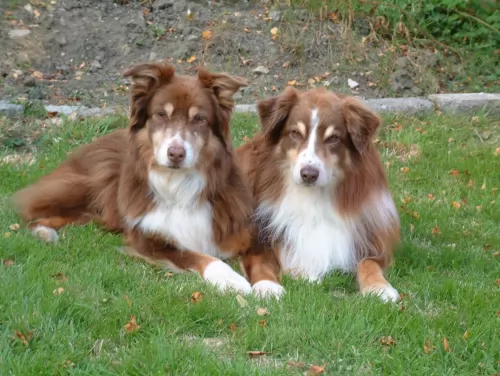 The mini Australian Shepherd has a long coat with seasonal shedding. You will need to give the coat a good brush twice a week to keep it untangled and to remove loose hair.
The mini Australian Shepherd has a long coat with seasonal shedding. You will need to give the coat a good brush twice a week to keep it untangled and to remove loose hair.
Other grooming for your pet will be to check his eyes and ears for infection, check for unusual lumps when you brush him and check for fleas and ticks. Keep his nails trimmed and brush his teeth 2 or 3 times a week to avoid plaque build up.
If you’re wondering how to keep your dog well groomed for the enhancement of this health, people such as your vet or professional groomers will do these grooming tasks for you.
Top quality commercially manufactured dog food packed with vitamins and minerals needs to be your choice if you're going to be using these dog foods. Avoid the cheaper brands that use lots of fillers, sugar, salt, colorants and preservatives.
Home-made food is a wonderful treat for a dog and delicious, nutritious and simple ingredients such as boiled chicken, brown rice or pasta and some cooked vegetables chopped up into his dry kibble from time to time will do him wonders.
Sometimes it will also be good to add in a little bit of raw meat too. Make sure there is a bowl of fresh, cool water available to your pet constantly.
 Training and socialization is important for any dog and not just the Puli. Well trained dogs are a joy to have around – they are obedient and well mannered. The Puli is intelligent enough for you to train him yourself or you can have a professional trainer do it for you.
Training and socialization is important for any dog and not just the Puli. Well trained dogs are a joy to have around – they are obedient and well mannered. The Puli is intelligent enough for you to train him yourself or you can have a professional trainer do it for you.
The Puli is an athletic dog but you don’t want to start with any strenuous exercise with a young dog less than a year of age. Take your young dog for walks and give him some ball games. Only start more strenuous exercise later on to spare unnecessary pressure on the joints which could lead to hip dysplasia later on.
Every dog needs to be brushed and groomed to ensure its health. A dog like the Puli will need additional grooming because of the long dreadlocks for a coat. Many Puli owners prefer to have the hair cut short.
The coat of the Puli luckily doesn’t shed much but the coat, if you keep it long, will require a special wide tooth comb. You’ll need to check inside his ears, check that his eyes are bright without any discharge and also trim his nails.
You will have to check inside his mouth too. He can’t tell you if he has a rotten tooth that is painful and causing him to be sick. You need to regularly check his teeth.
It is important to know how much to feed your Puli. A healthy diet is so important for good health and a long life. All dogs have different appetites depending on their age, their breed, their size, the season of life they’re in and their activity levels.
It is better to feed your dog twice a day as opposed to one meal a day to avoid life threatening illnesses such as bloat. There are excellent commercially manufactured dog foods, but also bad ones, so you want to make sure that the kibble you choose is a high quality one with lots of vitamins and minerals.
You want to give him some home-made food too, keeping it simple and uncomplicated – the way dogs like it. Boiled chicken, brown rice or pasta and spinach, sweet potatoes and carrots are a healthy choice for your pet.
Chop it up and add it into the dry kibble a couple of times a week. Some raw meat added in from time to time will contribute to him being healthy. Never leave him without a constant source of fresh, cool water.